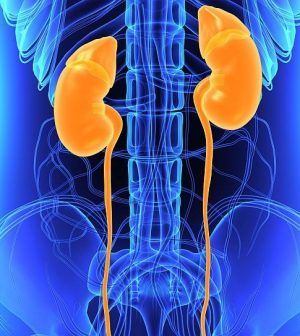- Recognizing the Signs of Hypothyroidism
- 10 Strategies to Overcome Insomnia
- Could Artificial Sweeteners Be Aging the Brain Faster?
- Techniques for Soothing Your Nervous System
- Does the Water in Your House Smell Funny? Here’s Why
- Can a Daily Dose of Apple Cider Vinegar Actually Aid Weight Loss?
- 6 Health Beverages That Can Actually Spike Your Blood Sugar
- Treatment Options for Social Anxiety Disorder
- Understanding the Connection Between Anxiety and Depression
- How Daily Prunes Can Influence Cholesterol and Inflammation
Drug Improves Survival for Rare, Deadly Kidney Cancer

The drug cabozantinib is more effective than two similar drugs, as well as the current standard treatment, in extending the lives of patients with a rare and deadly type of kidney cancer, according to a new study.
The cancer is called metastatic papillary kidney cancer. There are currently no effective treatments for it. A previous study of 38 patients found that the average survival rate was just eight months after diagnosis.
These findings could change how the cancer is treated, the research suggested.
“We still have a long way to go to help make patients’ lives longer and better, but we do have a new standard treatment for these rare cancer patients,” said study author Dr. Sumanta Pal, a clinical professor of medical oncology at City of Hope Cancer Center in Duarte, Calif. She’s also a researcher in the SWOG Cancer Research Network.
Mutations in the MET gene are a hallmark of this type of this kidney cancer, and new drugs target the MET gene, along with other important signaling pathways.
In this study of 147 patients, researchers compared three MET target drugs — cabozantinib, crizotinib and savolitinib — with the current standard treatment, sunitinib, a receptor tyrosine inhibitor.
The patients, most of whom hadn’t received any prior treatment, were randomly assigned to receive one of the four treatments.
Progression-free survival (the time it took before the cancer returned or spread) was a median of 5.6 months in the sunitinib group, and much shorter in the savolitinib and crizotinib groups.
However, it was 9.2 months in the cabozantinib group, and 23% of those patients had a significant reduction in the size of their tumor, versus 4% of those in the sunitinib group, the SWOG Cancer Research Network study found.
“The magnitude of the response was surprising,” Pal added in a SWOG/City of Hope news release.
The study was presented earlier this month at a virtual American Society of Clinical Oncology meeting and published simultaneously in The Lancet journal.
SWOG Cancer Research Network is part of the U.S. National Cancer Institute’s National Clinical Trials Network. City of Hope is an NCI-designated comprehensive cancer care center.
More information
The U.S. National Cancer Institute has more on papillary kidney cancer.
SOURCE: SWOG Cancer Research Network, City of Hope news release, Feb. 13, 2021
Source: HealthDay
Copyright © 2026 HealthDay. All rights reserved.










